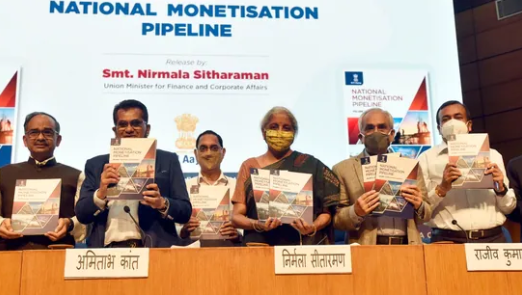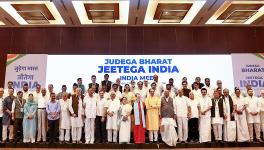Is India on the Road to Oligarchy?

Image Courtesy: Hindustan Times
The central government has announced a National Monetization Pipeline—in effect, a plan to hand over the country's assets to the private sector—even before it could resolve the agitation led by farmers against three pro-corporate agricultural laws. It has made many people wonder: is India turning into an oligarchy? A few capitalists are gaining so much control over the country’s assets, resources and businesses that they might determine the fate of all 135 crore countrymen. There is tremendous uneasiness among the Opposition parties, trade unions and the youth over this question.
The farmers fear that if the three agricultural laws get implemented, the annual agribusiness turnover worth over Rs. 25 lakh crore will come under the control of a few large companies. The farmers have expressed the fear that their condition will be akin to bonded labourers in such a system. Now preparations are on to raise Rs. 6 lakh crore from the “monetisation” of more than 22 assets administered by a dozen ministries. It has to be realised between 2022 and 2025. Of these assets, Rs.1,60,200 crore are to come from roads, Rs.1,52,496 crore from railways, electricity transmission is to contribute Rs.45,200 crore, electricity generation Rs.39,832 crore, the natural gas pipeline Rs.24,462 crore, and others, Rs.22,504 crore. Telecom, warehousing, mines, aviation, ports, urban real estate, even sports stadiums will be handed over to the private sector.
According to the government, all of this will not affect the ownership of properties. The private players will develop and operate them with their investment. The question arises that the private players never invested in building any of these assets. And, when roads, railway stations, airports, or mines are given to them, whether on long lease or short contracts, will the fact that the government owns them have any meaning? Companies will try to reap maximum profits from these assets. If they sense a whiff of losses, they will demand government support or leave the assets stranded. Besides, who will monitor how these organisations are managed and run once private players control them?
Even if, after some years, the property reverts to the government, how will it manage the concern? Chances are, the government would look for another private entity to manage these assets. The problem is that wherever an economy has turned to oligarchs, the welfare state character of that country changes irretrievably. In India, the Constitution establishes a welfare state. It is why citizens have the legal right to food, education and education, privacy, etc. It is also why schemes such as the MG-NREGA exist.
How much meaning will the words welfare state have when the country’s assets and resources are in the grip of a few corporate houses? It is not only this. When seen in the light of other Indian regulations, the danger to democratic welfarism is even greater. For example, electoral bonds enable large corporate entities to offer donations to political parties anonymously. A look at the statistics of electoral bonds in the recent past makes the picture automatically clear. During 2019-20, eighteen political parties in India received about Rs.3,441 crore in donations through electoral bonds, of which over 76% came into the BJP’s kitty. So, the ruling party, whose grace can get private companies to control, manage and own the country's wealth, stands to gain a hefty share of donations in the present set-up.
However, ever since the Centre passed the controversial agricultural laws last year, the voices of opposition are growing in the country, even against the monetisation pipeline. Soon after it was announced, the CPI(M) called it a loot of peoples’ property and the “official sale of India”. It is unwise to sell the crown jewels to meet daily expenses, the party has warned. Secondly, the market is footloose and fancy-free, especially at this time. Selling assets at rock-bottom prices will only benefit the corporate and encourage crony capitalism.
The Congress party had launched India’s liberalisation and privatisation drive in the nineties, but it even opposed the Centre’s latest endeavour. The party has fielded several leaders to inform the public about how dangerous the monetisation pipeline can be. As the monopoly of private companies increases, so will the employment opportunities shrink. Demonetisation, poorly implemented GST, the new agriculture laws and the drive to “monetise” public assets attack the unorganised sector, agriculture and small business. Their purpose is to establish the monopoly of certain companies. Everyone knows who runs the airports and seaports today. The assets of the country are being gifted to a handful of industrialists.
On the other hand, West Bengal Chief Minister Mamata Banerjee has also said that no one has given the government or the BJP the right to sell the country's properties. She says that the whole country will rise to oppose it.
All trade unions have also geared up to take to the streets in protest against the NMP and over the farmers protest. The important thing is that when the farmers’ movement started, it kept its distance from political parties. Still, most opposition parties, trade unions, students, youth and farmers are coming together regarding the NMP. There is high unemployment in states such as Uttar Pradesh, Bihar and Madhya Pradesh. In these states, vigorous movements are going on. The youth is demanding work, the repeal of the three agricultural laws and raising its voice against the NMP.
As the voices of different sections of society unite over these issues, there is growing uneasiness among some corporate houses. This is why efforts to create communal and caste divisions have intensified with help from the so-called godi media. A new jumla gets tossed out every day to divert the public, and TV channels—also owned by a few corporate houses—are crossing all limits of propaganda to push non-issues. They are showing and telling everything except news, everything that can foster divisions in society.
Of course, it is not the first time this is happening. This cycle of media-led control over the people, and corporate-led distraction, has been on since 1991-92. That was when liberalisation was kick-started, and sadly there seems to be no turning back. Whenever anti-people decisions are taken, a frenzy gets whipped up to entangle people in non-issues. Corporate houses, whose eyes stay fixed on the assets and resources they stand to gain, dominate the media today. They are doing whatever they want to make their gambit work.
The author is an independent journalist. The views are personal.
Get the latest reports & analysis with people's perspective on Protests, movements & deep analytical videos, discussions of the current affairs in your Telegram app. Subscribe to NewsClick's Telegram channel & get Real-Time updates on stories, as they get published on our website.
























